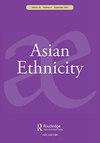Social network, trust, and rural informalities: transfer of tribal land ownership in protected areas of Assam, Northeast India
IF 0.8
Q3 ETHNIC STUDIES
引用次数: 1
Abstract
ABSTRACT Land alienation among its tribal communities has been one of the most disquieting issues in contemporary India despite existing laws for the protection of tribal land and habitat. This situation is attributed mainly to requisition of tribal land for various developmental activities undertaken by the state as well as its indifference in enforcing the existing laws. The situation in Assam clearly illustrates this. Despite the existing laws, the tribal communities have been unable to retain their ownership of the land. This paper shows that while the state-led development activities are significantly responsible for this, the various informal ways in which the transfer of tribal land takes place at a private level are also no less alarming. Explicating the dynamics behind this process, the paper divulges the multiple informal mechanisms, embedded in community network and trust at the local level to negotiate the protective land laws to facilitate the transfer of tribal land to non-tribal communities.社会网络、信任和农村信息化:印度东北部阿萨姆邦保护区部落土地所有权的转移
摘要尽管现行法律保护部落土地和栖息地,但部落社区之间的土地异化一直是当代印度最令人不安的问题之一。这种情况主要归因于国家为开展各种发展活动而征用部落土地,以及对执行现有法律漠不关心。阿萨姆邦的局势清楚地说明了这一点。尽管有现行法律,部落社区仍无法保留对土地的所有权。本文表明,虽然国家主导的发展活动对此负有重大责任,但部落土地在私人层面的各种非正式转让方式也同样令人担忧。本文阐述了这一过程背后的动态,揭示了嵌入社区网络和地方一级信任的多种非正式机制,以谈判土地保护法,促进部落土地向非部落社区的转让。
本文章由计算机程序翻译,如有差异,请以英文原文为准。
求助全文
约1分钟内获得全文
求助全文
来源期刊

Asian Ethnicity
PHYSIOLOGY-
CiteScore
2.80
自引率
6.20%
发文量
27
期刊介绍:
In the twenty-first century ethnic issues have assumed importance in many parts of the world. Until recently, questions of Asian ethnicity and identity have been treated in a balkanized fashion, with anthropologists, economists, historians, political scientists, sociologists and others publishing their studies in single-discipline journals. Asian Ethnicity provides a cross-disciplinary, international venue for the publication of well-researched articles about ethnic groups and ethnic relations in the half of the world where questions of ethnicity now loom largest. Asian Ethnicity covers any time period, although the greatest focus is expected to be on the twentieth and twenty-first centuries.
 求助内容:
求助内容: 应助结果提醒方式:
应助结果提醒方式:


